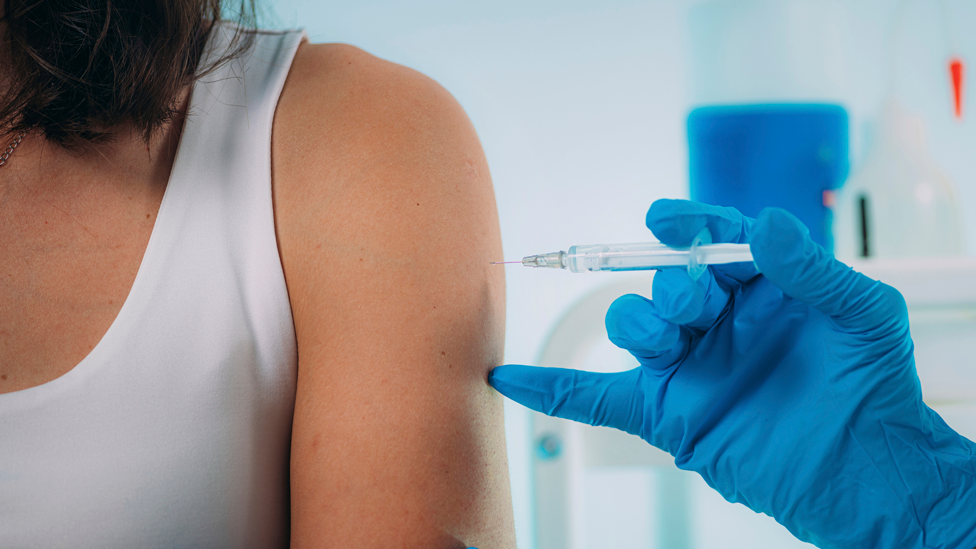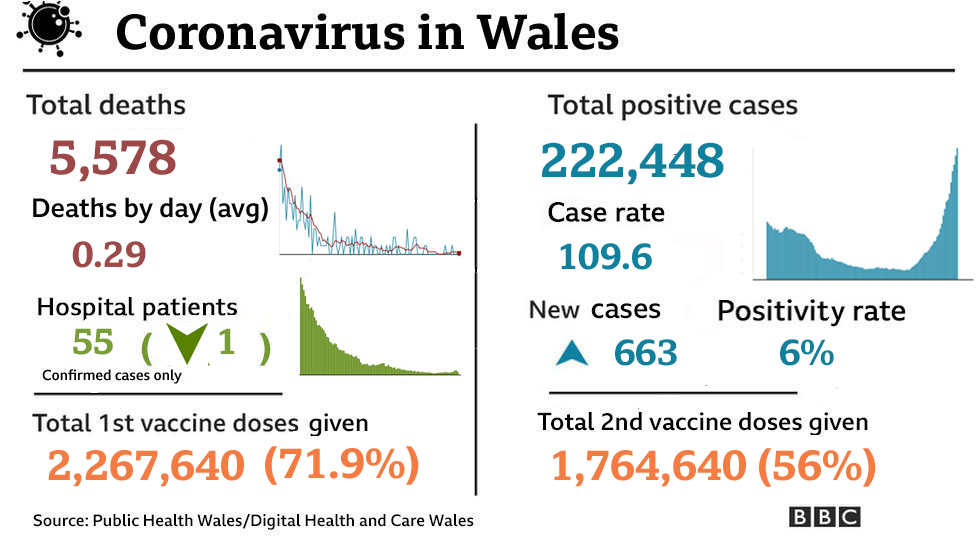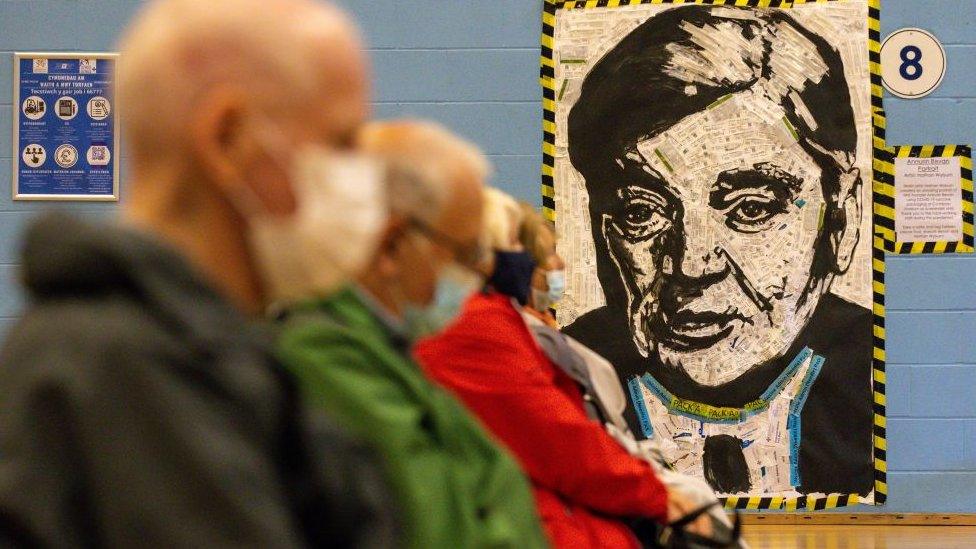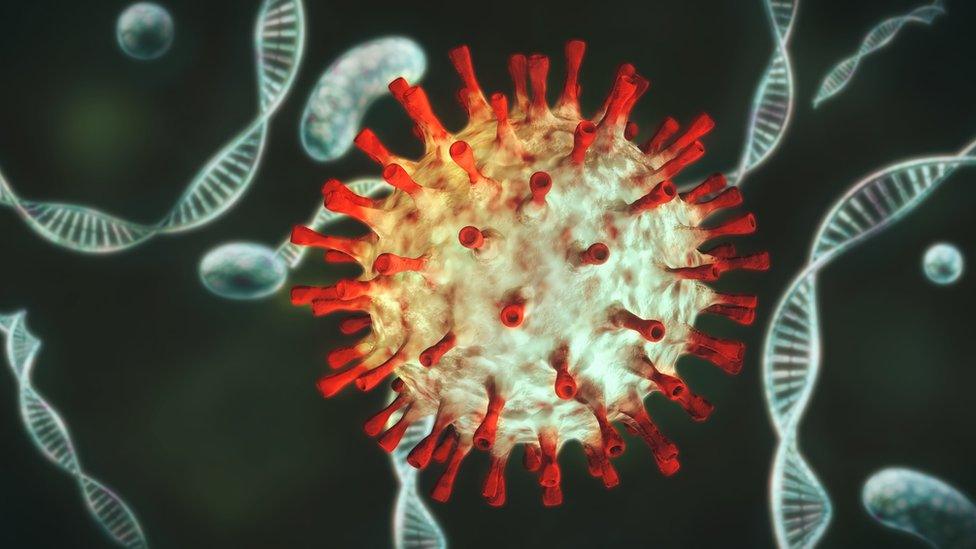Covid antibodies estimated for 91.8% of adults in Wales
- Published

The pace of the vaccine programme in Wales sees the modelled estimate for antibodies ahead of other UK nations and regions
Nearly 92% of adults in Wales now have antibodies to help protect them against Covid-19, the latest blood sample survey suggests.
Two-thirds of young people under 25 now have antibodies, up from just over half a month ago, the Office for National Statistics (ONS) estimates.
It takes samples to find out how many people have antibodies, indicating vaccination or having had Covid.
Having antibodies can help stop people contracting an infection again.
They are proteins in the blood that recognise specific infections and fight them off.
The survey is a reflection of the impact of the vaccination programme, although the ONS says finding antibodies alone is not a precise measure of the immunity protection from vaccination.

Updated results are published twice a month and the latest survey shows:, external
An estimated nine in 10 adults, or 91.8% of the adult population in Wales have antibodies - a rise from 82.1% a month ago
Two-thirds (66.4%) of 16 to 24-year-olds now have antibodies
This rises to nearly 89% of 25 to 34-year-olds
It rises through the age groups to 96.3% of 35 to 49-year-olds and 98.2% of 75 to 79-year-olds
The proportion of the population covered sees Wales ahead of the other UK nations - with 89.8% covered in England, 87.2% in Northern Ireland and 84.7% in Scotland.
Looking at the figures in England it is estimated that 59.7% of those aged 16 to 24 have antibodies, with 41.6% in Northern Ireland and 46.9% in Scotland.

The ONS in its analysis said the percentage of adults testing positive for antibodies in Wales continued to increase in those aged between 16 and 49 years.
The latest survey, of 1,764 people in Wales, took place in the week ending 20 June.
What else have we learned on Wednesday?

Health officials and ministers are looking closely at hospital figures for any sign of an impact from rising case rates, as restrictions ease.
Hospital admissions for patients testing positive for Covid remain steady and low, with a daily average of six patients. This is only 0.5% of all hospital admissions.
There were 55 patients with a confirmed positive Covid test in hospital beds on Tuesday. The daily average is up from 26 last week to 39. In mid-March, there was an average of 300 confirmed patients with Covid.
There were seven Covid patients in critical care or on ventilation on Tuesday, split between Betsi Cadwaldr, Cardiff and Vale and Hywel Dda hospitals. Critical care patients with other conditions outnumber Covid patients by more than 20 to one.

Case numbers are continuing to rise
As expected, case numbers are still rising, driven by clusters in Wrexham, Flintshire and Cardiff.
Rhos and Johnstown South in Wrexham has the highest case rate when we break down Wales into similar-sized communities. Positive tests are running at 10 a day there.
Wrexham's case rate is now around 255 cases per 100,000 - the 123rd highest in the UK.
Seven of its 18 districts have case rates above 200 per 100,000. Altogether around 50 communities across Wales are above 200 per 100,000.
Wales' overall case rate is 109.6 cases per 100,000 - still less than all other UK nations and English regions.
Merthyr Tydfil, Ceredigion and Pembrokeshire are among the lowest for case rates in the UK.
Just under 60% of all positive tests in the latest daily reported results were among people under 30.
There were no further deaths reported.

Rise in positive tests in care homes
There were 65 positive Covid tests in elderly care homes in Wales in the latest week - the highest number since mid-March.
There were 23 more in the week beginning 28 June than positive results which came back in the week before
Back in early-January, the number hit 1,500 positive tests in the peak week.
Routine weekly testing of both residents and staff in care homes re-started last September and it is continuing on scientific advice, despite the vaccination programme having now given full doses to 94.6% of residents and 87.7% of staff.
Across Wales, about 29,100 residents and staff were tested in the latest week. Positive tests do not necessarily mean the person is ill or showing symptoms, just that a positive result has come from a routine test.
- Published4 July 2022

- Published28 May 2024

- Published26 May 2021
